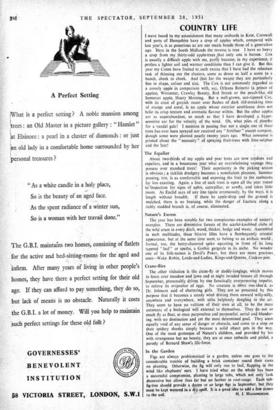COUNTRY LIFE
I HAVE heard to my astonishment that many orchards in Kent, Cornwall and parts of Hampshire have a crop of apples which, compared with last year's, is as penurious as are our meals beside those of a generation ago. Here in the South Midlands the reverse is true I have so heavy a crop from my thirty-odd apple-trees that only one is barren. Cox is usually a difficult apple with me, partly because, in my experience, it prefers a lighter soil and warmer conditions than I can give it. But this year my Coxes have fruited to such excess that I have had the reluctant task of thinning out the clusters, some as dense as half a score to a bunch, cheek to cheek. And (but for the wasps) they are particularly fine in shape, colour and size. The Cox is not commonly regarded as a comely apple in comparison with, say, Orleans Reinette (a prince of apples), Worcester, Crawley Beauty, Red Streak or the peach-like old Somerset apple, Hoary Morning. But a well-grown, sun-ripened Cox, with its crust of greyish russet over flushes of dark red-streaking tints of orange and coral, is an apple whose exterior semblance does not belie its crisp texture and aromatic flavour within. But the other apples are as superabundant, so much so that I have developed a hyper- sensitive ear for the velocity of the wind. Oh, what piles of plunder for a vandal gale! I mention in passing that not a single one of these trees has ever been sprayed nor received any " fertiliser " except compost, though some were planted nearly twenty years ago. What nonsense is printed about the " necessity " of spraying fruit-trees with lime-sulphur and the Test!


































 Previous page
Previous page